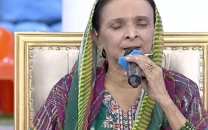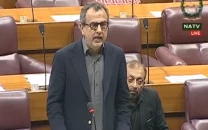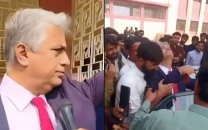Local governments: Mainstream parties eye devolution of powers
PML-N distances itself from the 2002 local govt system; PTI plans a new system of village governance.

PML-N distances itself from the 2002 local govt system; PTI plans a new system of village governance.
Pakistan Muslim League – Nawaz calls for a decentralization of governance, whereas Pakistan Peoples Party readdresses the 18th amendment to support local governments.
The Express Tribune examines manifestos of mainstream political parties to see how they support the local government and the devolution of powers in the next five years.
PML-N

PML-N advocates consolidating democratic institutions and traditions both at the federal and the provincial level. This imperative of democratic governance, they say, can be attained through a rigorous process of decentralizing powers.
Their aim is to devolve political, administrative and financial powers to elected representatives at district and lower levels as stipulated under Article 140-A of the Constitution. PML-N pledges to hold local government elections within six months of the general elections. The party wishes to give representation to women, peasants, workers, technocrats, minorities and, for the very first time, the youth in local bodies.
The manifesto justifies the delay in establishing a system of local governance by putting the blame on military dictators. They say the system has not been able to evolve soundly because under military rule, a new system of local bodies was introduced and therefore could not survive the military to civilian government transition. Thereby, PML-N hopes to draft new laws that will replace the 2002 local government system.
PPP

In Pakistan Peoples Party’s manifesto, the responsibility of holding local elections rests with the Election Commission of Pakistan.
The party reiterates their resolve to abide by the eighteenth amendment in their manifesto, saying under their rule, each province will establish a system of local governance, which will devolve political, administrative and financial responsibility to the elected representatives.
In its manifesto, PPP claims to have devolved power to the grassroots level in ‘real terms’.
“Governance cannot be effective unless it is responsive to the people, and local government is essential for responding quickly and efficiently to the immediate and basic needs of the population,” the party says, highlighting the importance of local bodies.
PTI

Pakistan Tehreek-e-Insaf has crafted a bottom-up system of governance, where rural governance begins with the village.
Each village, as the manifesto states, will be governed by an empowered village council for which elections will be held on the basis of Open Free List System, under which candidates do not need to contest against each other.
PTI has the expertise of holding such elections, as their intra-party polls also followed the Open Free List System.
Village councils will be given access to self-generated funds besides provision to recurring and development funds.
‘Oversight committees’ comprising village council members will be created to oversee the functioning of health units, schools, police stations, revenue, irrigation and agriculture departments.
In cities and towns, the municipality and the city government will be responsible for ensuring smooth governance. These bodies will raise revenue independently for city development.
MQM

The Muttahida Qaumi Movement, when announcing their manifesto, placed most emphasis on local body systems of governance.
In their manifesto, the party has pledged to empower the Election Commission of Pakistan, as it will ensure neutral and impartial local government elections.
Under the devolution of powers, MQM wants to place the police under the city and district government.
ANP

The Awami National Party prioritises holding local body elections upon assuming power. Their manifesto states that for strengthening democratic process and improving access and quality of services to the people at their doorsteps, local governance is an absolute necessity.
Under its local government system, the party eyes an increase in seats for women.
Published in The Express Tribune, May 6th, 2013.



















COMMENTS
Comments are moderated and generally will be posted if they are on-topic and not abusive.
For more information, please see our Comments FAQ